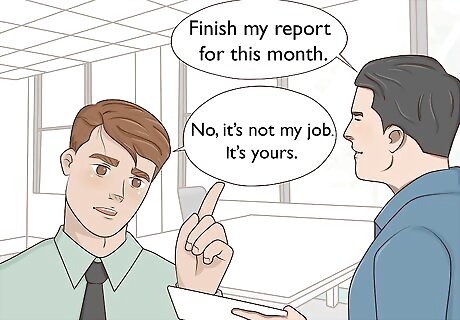
views
X
Research source
Even if assertiveness doesn't come naturally to you, it is a skill you can learn, and this article will provide you with a starting point.
Building Confidence

Start small. If you don't feel confident speaking your mind at work, it might not be the best idea to dive right in by volunteering for a major presentation or asking the boss for a big raise. Instead, start with something smaller. For example, if you were promised some new supplies, like a new monitor for your desk, but your supervisor has forgotten about it or hasn't gotten around to it, make a polite request for those items you've already been promised. Small victories will build up your confidence and help you feel empowered to speak up on larger issues.

Celebrate your successes. When you achieve something important at work, don't keep it to yourself. You don't want to brag too much, but recognizing your own achievements (and having others recognize them) is important to building your self-confidence. Getting in the habit of self-reward and self-acknowledgement will help you feel your own worth and value.

Pretend you are confident. Even if you don't feel it inside, pretending like you are confident can make you feel more confident, especially if you make a habit of it. For example, try to smile at your coworkers, and look them in the eye. Walk with some spring in your step, like you're heading somewhere important. Dressing with authority can also make you feel more authoritative. Pick out clothes that are true to your own style and personality, but also convey the idea that you are a professional. This strategy can both make you feel more confident, and can also lead others to treat you with more respect, which can likewise help boost your confidence.

Practice daily. Think about day-to-day situations in which you often feel uncertain of yourself or hesitant to speak your mind, and look for an opportunity to practice acting confident and speaking up every day. This may feel awkward at first, but this is how new skills are learned. Consistent practice is the path to mastery. Repetition and success will eventually make this start to feel natural.

Engage in self-reflection. It's important to spend some time thinking about tasks or discussions to which you could contribute more, areas where you are strong, and areas where you have room for improvement. Being assertive doesn't mean behaving as if you and your ideas are perfect. True confidence comes from emphasizing your strengths, but also understanding your weaknesses and doing what you can to challenge yourself to improve in those areas.

Dismiss unfounded criticism. If someone at work criticizes you by saying something that isn't true or isn't fair, try not to dwell on it. Time spent obsessing over criticism that isn't constructive can damage your confidence. It's also a waste of energy.
Projecting Confidence

Speak up. An important part of being more assertive at work is appearing (and being) confident in what you have to say. One powerful way of conveying this is simply making your voice heard in situations where your opinion or perspective might be valuable. Don't wait to be called on, but instead, make your views known. This does not, however, mean your voice always needs to be heard first. Sometimes, it's a better idea to let someone else speak first, and find a way to piggyback your own ideas on top of theirs. This can increase the likelihood of your ideas being approved. For example, it might be a good idea in a meeting to wait for two or three people to speak, then put forward your own ideas, saying something like, "My idea, which works well with Janet's idea, is....

Say no. If you are asked to do something that is not part of your job description, or which you don't have time for because of other projects, you should feel comfortable saying "no" to your coworkers. This doesn't make you selfish.

Don't be aggressive. Being assertive doesn't mean you always get your way, and it doesn't mean silencing other people. The goal of assertiveness is to be confident and persuasive, but not to be demanding, rude, or controlling of others. Practice empathy. Pay attention to the attitudes of those around you and give them a chance to share their views as well. Being respectful of other people's opinions will create a more positive environment in which everyone can feel more comfortable sharing their ideas. Not only does this create a more harmonious workplace, it will allow you to feel more comfortable speaking your mind without fear of judgment or undue criticism. Being aggressive can actually undercut your ability to make your ideas heard, as your co-workers may be put off or distracted by aggressive mannerisms.

Aim for respect, not friends. A professional relationship is different from a social one. In the workplace, being respected as an authoritative and valuable member of the staff is more important than being well-liked by your fellow employees. This is especially true if you are in working in a leadership capacity. Providing those who you are supervising with honest, constructive feedback on their work may not be pleasing to everyone, but is the path to an efficient, effective staff. Sometimes expressing your honest opinions or assessments won't endear you to your coworkers, but this should be a secondary concern in a professional setting.
Speaking Effectively

Think about what you want to say. An important part of assertiveness is clear communication. Whether you are speaking up at a meeting, having a one-on-one with your boss, or participating in a team project, you will communicate more clearly and effectively if you've given some thought to what you want to say first.. Having a plan for what you want to say before you start talking will make your thoughts and ideas come across more clearly and confidently. If you have to present your ideas at a meeting or in some similar forum, do some research on the topic first. If you are well informed about your topic, you will likely be seen as more authoritative, and probably feel more confident.

Clear the clutter. When considering what you want to say, make sure to craft your message in such a way as to get right to the point, eliminating any information that isn't necessary to the main idea. Tangents and going off topic may cause your listener(s) to stop focusing on what you are saying.

Practice talking about your ideas. Although you can't anticipate every workplace situation, if you know you'll be at a meeting where you'll want or need to present ideas or information, it's smart to practice your presentation beforehand. An idea that may seem clear to you in your own head may sound jumbled and confusing when you say it out loud. Practicing the presentation of your thoughts gives you chance to make sure they are clear and well organized before you speak. Practicing is also good way to reduce "filler," those distracting words or phrases you may use to avoid silence while you gather your thoughts (e.g. "um," "uh," "you know," "like," etc). These space-fillers can make you seems less confident and informed, but you'll be less likely to rely on them if you've practiced what you have to say in advance.

Manage your volume. A soft, quiet voice will be some as a lack of confidence or authority. Try to speak up so that your words will be taken more seriously. This may also take some practice on your part. Do not yell. While it is important to make your voice heard, you don't want to be seen as disrespectful or overbearing.

Manage your pacing. Speaking too quickly can make you appear nervous and also make it harder to keep up with what you're saying. Speaking too slowly can make you appear dull or cause your audience to lose interest. It is perfectly acceptable to pause for a drink of water if you need a second to gather your thoughts or let your audience catch up. If you'll be doing a lot of public speaking, consider recording yourself as you practice your presentations. This will help give you a better sense of whether your pacing is effective.

Avoid undercutting yourself. Do not use language that makes you seem uncertain or suggests your ideas are not valuable. For example, don't use the word "just," e.g. "I just think we might want to consider a more ambitious plan." This suggests you don't think your idea is all that valuable. Similarly, don't start sentences with phrases like "I could be wrong, but..." or "This is only my opinion, but...." These kinds of openings immediately tell your audience that they should not take your opinion seriously.


















Comments
0 comment